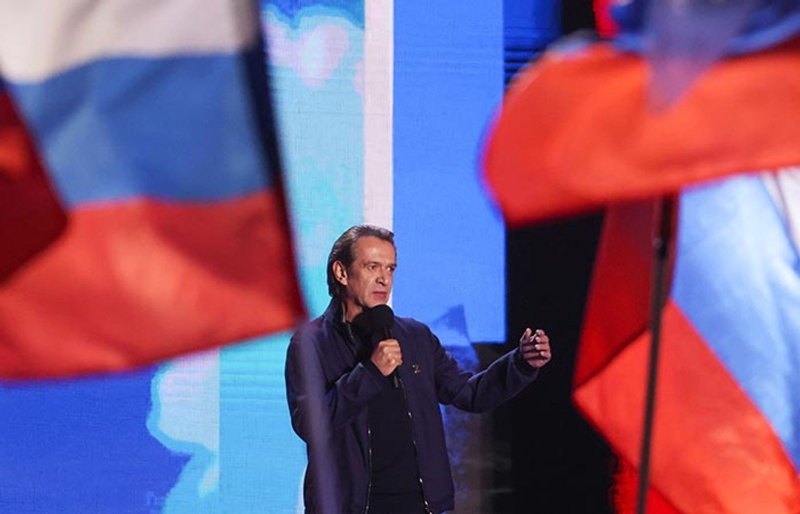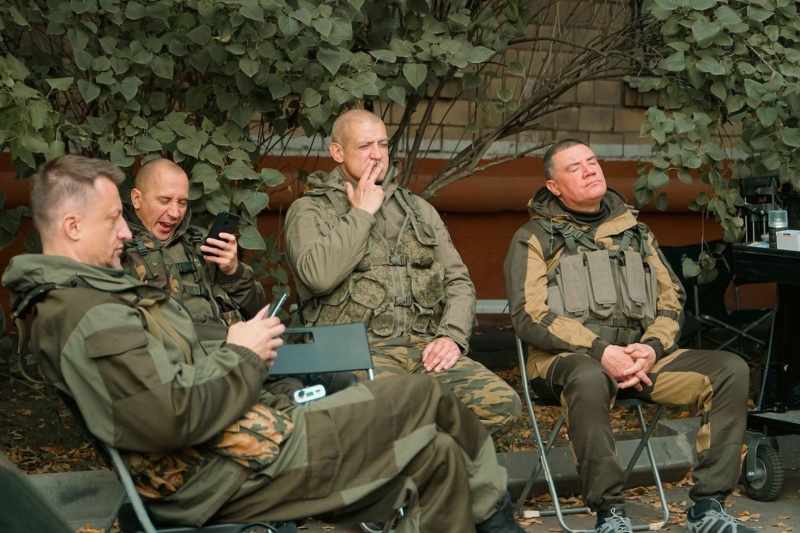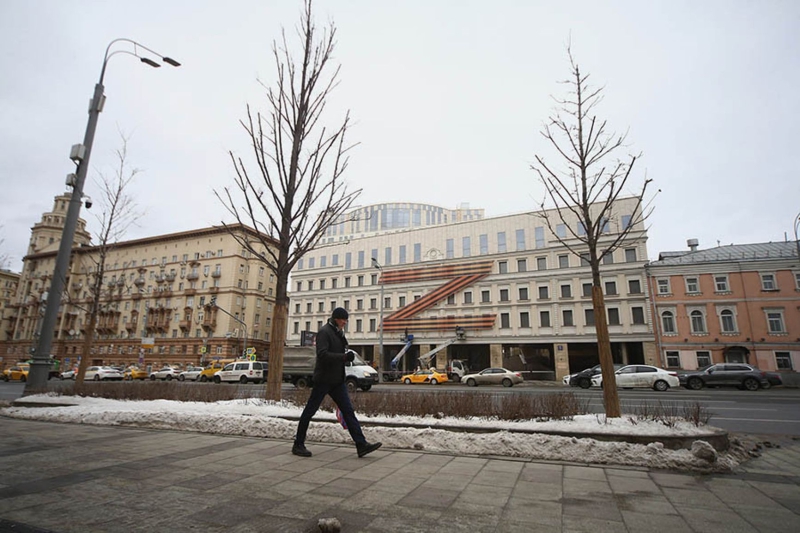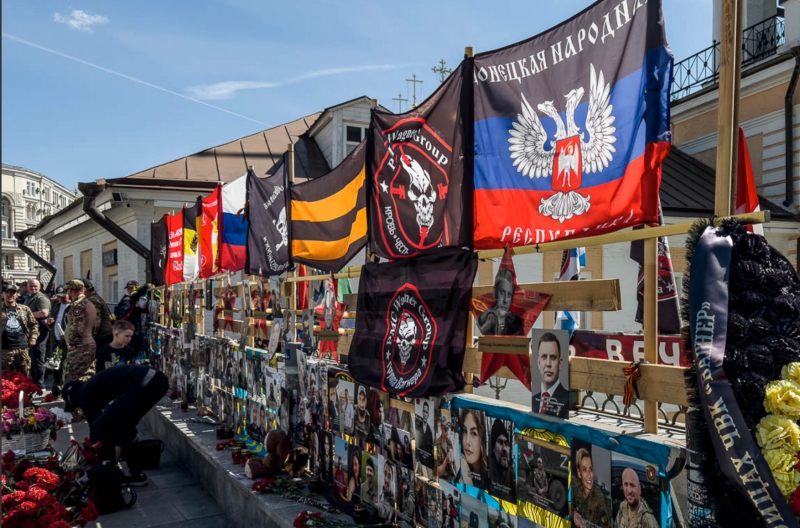All across Russia, administrative buildings and roadside billboards are decorated with the Latin alphabet’s letter “Z” — a symbol of support for the Kremlin’s ongoing invasion of Ukraine — and the country’s cultural space has been flooded with jingoistic art. But just about nobody’s buying. From the Bolshoi Theatre to bookstores and popular music venues, state-funded “patriotic” operas, plays, pop songs, poetry collections, and films have all failed to attract a popular following. In addition to their pro-war pathos, the two factors uniting all of these projects are Kremlin money and commercial failure. Film critic and columnist Ekaterina Barabash is not surprised. In many cases, it’s actually the lack of audience interest that drives directors, writers, and musicians to take on “patriotic” state commissions.
Not listed in the charts
Timed to the 80th anniversary of the Soviet victory in World War II, Not Listed recently premiered in Russian cinemas. Based on the novella by Boris Vasilyev, the film came with a jaw-dropping budget of 1 billion rubles ($12.7 million). A large share of that went toward building enormous sets — including a replica of the Brest Fortress that spanned the size of six football fields. The Cinema Foundation, the government’s main support body for the industry, allocated 400 million rubles in funding ($5.1 million). Fifteen producers took part, and Vladimir Mashkov played one of the lead roles.

With such high production costs, Not Listed was expected to bring in record-breaking box office returns. The film premiered on May 1, just before a string of public holidays that included the 80th anniversary of the Soviet Union’s victory over Nazi Germany in World War II. As of mid-July, however, the patriotic product had earned just 657 million rubles ($8.4 million). While that would be a respectable figure for most Russian movies, it falls far short of covering production costs.
Critics tore the film apart, with even the most sympathetic reviewers pointing out only its impressive visuals — sets, makeup, battle scenes that place it among Russia’s top blockbusters in terms of scale — cannot make up for the lack of substance. Unlike Vasilyev’s concise and tightly written novella, the adaptation directed by Sergei Korotayev suffers from disjointed storytelling, with characters behaving in ways that defy basic logic. What was meant to be a heroic and deeply human story about the defense of Brest Fortress turned into a collection of flashy clichés, with a lead character who, despite the brutal combat, remains neatly shaven and perfectly groomed.
Critics tore Not Listed to shreds
In recent years, nearly every patriotic-themed film has flopped at the box office. For instance, Blindazh (The Dugout), a semi-fantasy film by Mark Gorobets about the war in Donbas, earned just 107 million rubles ($1.4 million) against a budget of nearly half a billion ($6.4 million).
The Postman, about a mail carrier working during wartime, grossed just over 7 million rubles ($89,172). Its budget wasn’t disclosed, but the number of copies released — nearly 2,000 — suggests a sizable investment.
Call Sign “Passenger”, a film about two brothers’ adventures in the Donbas in 2014, brought in only 7.5 million rubles ($95, 542) despite state support of almost 300 million rubles ($3.8 million).
Many state-supported films never even made it to theaters. But despite this bleak financial picture, the volume of patriotic movies being produced by the Russian film industry continues to grow.
The recent history of patriotic cinema
The film industry of the Soviet era had been saturated with stories of the state’s WWII heroes — rank-and-file soldiers, daring espionage agents, and citizens struggling for the cause on the home front. But after the breakup of the USSR, the genre virtually disappeared. The public was exhausted with propaganda, the state was no longer subsidizing “patriotic” productions, and the lifting of censorship opened up new avenues for creativity.
Even before Vladimir Putin’s rise to power, however, things began to shift. A new-old state ideology emerged — one rooted firmly in more formal displays of patriotism. The government began to craft what would later be called “spiritual bonds” — a value system that heavily stressed traditionalism and national pride.
The mass production of big-budget patriotic films in post-Soviet cinema began in 1998 with Nikita Mikhalkov’s The Barber of Siberia. “He’s Russian. That explains a lot,” was the slogan used to promote the film not just in the Russian Federation, but across the former Soviet Union and even in the United States. The movie had a budget of around $35 million, but earned only $2.6 million at the box office. To this day, many still remember it as a spectacular and emblematic Kremlin-backed failure.
Nikita Mikhalkov’s state-backed 1998 film was promoted with the slogan “He’s Russian. That explains a lot”
Mikhalkov blamed the film’s failure on biased critics, who he claimed had turned audiences against him before they even entered the cinema. Rather than trying something new though, the director launched a new patriotic campaign, and his two-part sequel to Burnt by the Sun (1994) bombed even harder. The first, Exodus, recouped a little over $7 million of a $40 million budget, while the latter Citadel earned back only $1.5 million against $45 million spent.
When war broke out in eastern Ukraine in 2014, films echoing Mikhalkov’s old promotional slogan — “He’s Russian. That explains a lot” — began to appear with increasing frequency. At the time, explicitly “anti-Ukronazi” films were still rare — perhaps the only examples were the thoroughly inept Militia Girl by Yuliya Gusmanova and Donbass. Outskirts by Renat Davletyarov. The latter bluntly blames Ukraine for starting the war and portrays the “militiamen” as defenders of civilians.
After Russia’s full-scale invasion of Ukraine in 2022, a new surge of patriotic war films emerged — these based on the current conflict. Titles like The Witness by David Dadunashvili openly depict Ukrainians as Adolf Hitler enthusiasts — complete with portraits of the fuhrer hidden in their coats and busts of the actual Nazi leader decorating their “Ukronazi” lairs.
Who profits from war movies
Look at the names behind these films, and even fans of Russian film will notice more unknown filmmakers than known commodities. “Patriotic” cinema is a safe bet — state funding flows to just about any project, and unlike private investors who are primarily interested in making money, in this case the backers are most interested simply in scoring political points — ideally without the public actually noticing.
For example, before 2022, David Dadunashvili worked quietly on modest TV dramas aimed at the homemaker demographic. But after his grotesque anti-Ukrainian film The Witness was released in 2023, at least people were talking about him — even if not in the way he might have hoped. He’ll be invited to do another propaganda piece. Or take Maxim Brius, who directed Solntsepyok (Blazing Sun), a film that drenches Wagner Group mercenaries so thoroughly in reverent awe that viewers may get the urge to hug every last one of them.
When it comes to state funding for “patriotic” films, most backers are most interested in scoring political points
The second category consists of pure cynics who don’t care what they shoot — as long as it pays. Their only ideology is profit. One of the most vivid examples is Nikolai Lebedev. Once a promising young auteur, Lebedev gradually became hooked on tales of Russian pride. His 2013 biopic, Legend No. 17, a fully patriotic film about hockey player Valeri Kharlamov, portrays Soviet athletes as noble heroes battling Western sports moguls who are obsessed with money. Despite its flaws, the film was a solid professional effort. But Lebedev’s next film, Nuremberg (2023), was built entirely on pitting Soviet and Western ideologies against each other — and it’s not too tough to guess which one comes out on top.
The third category of “patriotic” directors is the most puzzling. These are well-known, successful, and often talented figures who previously had shown no support to Putin or his war, yet suddenly began taking on highly problematic projects. Cinematographer Oleg Lukichev, who has worked with real artists like Kirill Serebrennikov, Renata Litvinova, and Vera Storozheva, directed a screen adaptation of Militia Romance by Zakhar Prilepin. Director Gleb Aleynikov, a radical innovator who had never collaborated with the state, signed on to the TV series Take Her Across the Maidan, which purports to show “how and by whom the revolution in Ukraine was planned.” Predictably, the answer is Ukrainian con men and Western Russophobes.

Still, the impression remains that “patriotic” themes in cinema offer a safe path for those dissatisfied with their careers — namely, for creators looking to gain recognition and improve their financial standing.
Theatres of war
The situation in Russian theatre is similar to the cinema scene. While cinema has been the regime’s main ideological tool for over a century, the authorities often viewed theatres as potential breeding grounds for dissent. In 2021, Kirill Serebrennikov was fired as artistic director of the Gogol Center — officially over financial violations, but in reality for his public criticism of the Putin regime.
While cinema is seen as the state’s main ideological weapon, the first repressions in today’s Russia began in the theatre
After the start of the full-scale war, the crackdown only intensified. Rimas Tuminas was forced out of his role as artistic director of the Vakhtangov Theatre. In November 2022, chief director Yuri Butusov failed to return from abroad to the same theatre. That same year, Joseph Raihelgauz stepped down as head of the School of Modern Drama. Official statements gave the usual line — “contract not renewed” — but Raihelgauz (and others) believe his ouster was the result of his refusal to toe the party line and his lack of overt support for the war. He was replaced by Dmitry Astrakhan.
Meanwhile, the Gogol Center — already back under its old mothballed title, the Gogol Theatre — came under the direction of Anton Yakovlev, who quickly filled the venue with the musty air of the past. One production about World War II, put on by outspoken militarist Polina Agureeva, was such a disaster that it was pulled from the repertoire after just a few performances.
The year 2024 proved especially rich in theatre leadership reshuffles. Vladimir Mashkov took over first as director, then as artistic director, of Sovremennik. Konstantin Bogomolov was handed the Viktor Ryzhakov Theatre. After the dismissal of Satire Theatre’s artistic director Sergei Gazarov, the post went to Yevgeny Gerasimov.
All the new theatre directors are unquestioningly loyal to the regime. Many now oversee not just one stage, but two at once — Mashkov also runs the Oleg Tabakov Theatre, Bogomolov heads the Theatre on Malaya Bronnaya, and Gerasimov leads the Theatre on Malaya Ordynka. In 2025, to the surprise of many, Vladimir Pankov was appointed artistic director of Lenkom. Pankov is known both for his innovative productions and his open support for the war.
Needless to say, all these appointees publicly align themselves with Putin’s policies. Of the group, only Yakovlev maintains a relatively low profile, avoiding loud declarations of love for the “special military operation.” Bogomolov also refrains from daily tributes to the Russian army, but his manifestos do still clearly support the “state of affairs in the country.” Mashkov and Gerasimov, meanwhile, are the regime’s most devoted advocates. Mashkov was the first — back in March 2022 — to hang a giant Z in the colors of the St. George ribbon on the facade of the Tabakov Theatre.

All previously prominent Russian theatre directors have either been dismissed or left the country. One of the most painful departures was that of Dmitry Krymov, who made no secret of his antiwar stance. Those who remain stage carefully curated productions that steer clear of politics. Directors who dare to so much as hint at the current situation are viewed as virtual dissidents.
Moscow audiences continue to praise the courage of Yevgeny Pisarev, who staged the musical Cabaret — about the rise of fascism in Germany — at the Theatre of Nations. He also put on a production of Tartuffe, which contains unmistakable references to present-day repression in Russia. It’s hardly surprising that the Rampa Theatre in Primorsky krai was banned from staging Cabaret.
On the one hand, theatres fear the financial risk of poor turnout. On the other, most are state-owned and thus cannot avoid participating in ideological brainwashing. As a result, many have chosen a middle path. The Vakhtangov Theatre and Lenkom, for instance, take part in fundraising drives and thematic readings in support of the “special operation.” By contrast, the Taganka Theatre expresses its loyalty to the war in its own way — by handing out free tickets to participants in the “special military operation” and their families.
Theatre critic Nina Agisheva-Nikolaevich told The Insider that many projects related to the “special military operation” remain invisible to the theatre-going public but still bring solid profits to their organizers:
“There’s a massive number of pitch sessions and competitions being held in Russia, with very substantial funding allocated to them — but most people only follow productions in Moscow and St. Petersburg, and theatre lovers are generally only interested in the performances themselves. The organizers of these events make good money. It’s a clever system: you don’t overtly show your support for the war — you don’t make a fool of yourself in front of the audience — but you still fulfill the top-down orders. And you get paid. For many participants, it’s also a way to get noticed. Suddenly, we’re seeing a flood of playwrights and directors no one had heard of even yesterday — completely talentless people, and now they’re in demand.”
In Moscow, on Putin’s orders, a dedicated “patriotic theatre” is set to open by Nov. 30. Most likely, it will be headed by Zakhar Prilepin, who personally proposed the project. It’s clear that no one will actually want to go to this theatre, but that’s not what’s important. Significant funding has probably already been allocated and divvied up among the “patriotic” theatre elite.
The literary heroes of the “special military operation”
“Patriotism” and support for the war have also made their way into the publishing industry. Last year, the EKSMO-AST group reported a dramatic surge in sales of books on patriotism, Russian history, and military strategy. In 2023, unit sales of such titles rose by 15%, while revenue grew by 30% year-on-year. Sales of children’s books on similar topics jumped by a whopping 78%. These are impressive numbers, but only at first glance.
The founder of the Freedom Letters publishing house, Georgy Urushadze, told The Insider that these figures should not be taken at face value:
“Of course, this so-called sales growth exists only to appease the Z-poets and Z-writers, who started making noise after the war began — claiming they were being suppressed, not being published, even though they’re ‘so necessary right now.’ So EKSMO came up with two ways to resolve the situation. First, they began including previously published titles in the category of patriotic literature — Prilepin’s books, for example, or old children’s books about pioneer-heroes. Same books, new statistics, and the numbers look impressive. You can manipulate these stats however you like. Why not include Tolstoy’s Hadji Murat? Isn’t that a patriotic work?”
At the same time, even the most prominent pro-war writers are seeing minuscule print runs. Zakhar Prilepin’s new novel Tuma, considered a bestseller, was released with just 50,000 copies — not much for a well-known author. For others, the mere fact of being published is the real reward.
The poetry collection The PoeZy of the Russian Summer, featuring 25 completely unknown authors, had a print run of 3,000 copies. These writers, unsurprisingly, earn no money from their work. The ones profiting are those who organize the events where these authors appear — festivals, readings, contests.
From Z.Fest Poetry to PoeZy Z and the patriotic festival Dedicated to the Heroes of Z, literary patriots certainly aren’t feeling abandoned. Of course, they will not break through anywhere else, but they don’t need to — when else would any of them ever get a chance to feel this needed? The budgets for such events aren’t disclosed, but experts estimate that the most expensive cost sponsors up to 150 million rubles ($1.9 million), with an average budget of about 25 million ($318,000).
Meanwhile, bookstores are forced to cover up the jackets of books written by “foreign agent” authors — if not remove them from sale altogether. In May of this year, Falanster bookstore was fined 80,000 rubles (just over $1,000) for selling Igor Olinevich’s Going to Magadan — because it was published with the support of the “undesirable organization” Anarchist Black Cross Federation. And it isn’t just Russian antiwar authors who are being pulled from shelves. In March 2025, prosecutors visited Falanster with an “inspection,” seizing works by philosophers Michel Foucault, Walter Benjamin, Hannah Arendt, and Susan Sontag — even though neither the authors nor their writings are banned in Russia.
The prosecutor’s office seized books by Michel Foucault, Walter Benjamin, Hannah Arendt, and Susan Sontag, even though their works are not banned in Russia
A word about music
Mass culture — especially pop and rock music — has also come under government scrutiny. As with theatre, the situation here is tricky: performers’ income depends on ticket sales, and any overly blatant pro-Putin display risks alienating an audience already tired of constant patriotic rhetoric. However, an antiwar stance still guarantees that an artist will be blacklisted from concert venues, television, and the radio — even if there have been no high-profile arrests in the music scene so far. Classical musicians, too, have faced repression, though less popular genres remain largely untouched by the authorities.
But musicians with genuine pop culture appeal cling tightly to their audiences, and early on in the war, some Z-artists did improve their financial standing. The most prominent example is Yaroslav Dronov, better known as Shaman. His songs “I am Russian,” “Let’s Stand Up,” “Celebrate, Russia!” and “My Russia” climbed to the top of the charts and stayed there for weeks. Yet three years into a conflict that continues with no end in sight, concerts for this new “Z-star” have been quietly canceled, and the main reason cited is low demand for tickets.
Music journalist, producer, and concert promoter Anton Chernin explains that the Russian music market has drastically shrunk since the end of February 2022:
“Many artists have left or gone silent. Boris Grebenshchikov and Andrey Makarevich, Zemfira, Mumiy Troll, Oxxxymiron, Monetochka, Noize MC, Bi-2, Splean, Nogu Svelo!, Tequilajazzz, Dmitry Spirin, and many others have departed. For those who remain, there’s more space and higher stakes — but they can’t overdo it either: performing too often risks wearing out the audience. Some are fine with the situation and openly support the ‘party line.’ Others endure quietly, writing some new material that never sees the light of day — like in the 1970s — but they continue performing across Russia. Curators from the presidential administration and related bodies — who now oversee all well-known artists — apply pressure, but not too harshly: if out of roughly 300 performing musicians only 30 continued actively touring the thousands of Russian venues, the market would simply collapse, which no one wants.”
Altogether, this summary of the Russian cultural scene suggests a lack of strong interest in military-patriotic themes and highlights cultural managers’ concerns that such projects will likely lead to financial losses. As for Putin and Prilepin’s plan to create a special theatre, it seems destined to fail — unless, perhaps, attendance is made mandatory for children from orphanages, and for military personnel.

